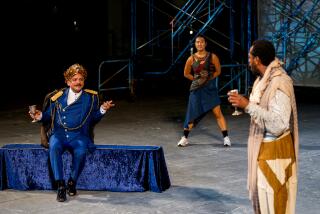An arrow through the heart
- Share via
Romantics with a penchant for sappy ballads and gooey sentiments are likely to be taken aback by the view of amour in Euripides’ “Hippolytos.” Aphrodite, goddess of love, may have the power to turn us deliriously gaga, but make no mistake about it: She’s also a cold-blooded killer.
Ah, Greek tragedy. So unflinchingly truthful, so thrillingly complex. And what better way to inaugurate the Getty Villa’s magnificent outdoor Barbara and Lawrence Fleischman Theater than with Euripides’ poison valentine “Hippolytos,” a classic better known from its latter-day incarnations, as the accompanying exhibition tracing its legacy from Seneca to Racine and beyond reminds.
The production, which runs through Sept. 30, is part of an exciting new Greek theater program at the Villa that should aspire (without fear of hubris) to become the country’s foremost venue of such theater. True, the staging is more visually than dramatically mesmerizing, but the chance to see one of the rarely done tragedies couldn’t be more welcome.
Like Euripides’ late masterpiece “The Bacchae,” “Hippolytos” demonstrates the danger of spurning one of the gods, who, in the playwright’s envelope-pushing view, were as much elemental forces of nature as anthropomorphic deities. Think of it as the rejection of a fundamental human reality.
Here it’s Aphrodite, or erotic love, that gets the cold shoulder. Hippolytos, the fanatically pious son of Theseus, has eyes only for the virgin goddess Artemis. The enormous, preening pride he takes in his chastity lights a fire inside his stepmom, Phaidra, whose passion Aphrodite has stoked.
Poor girl tries to starve herself to death out of shame, but she unwisely ends up confessing the cause of her malady to her crafty old nurse, who intervenes to disastrous effect. Of course, none of this comes as a surprise. Aphrodite spells out the catastrophes -- payback in her eyes -- at the top of the play, which rather than kill off the suspense helps us follow the tricky path of Euripidean ideas.
As much about the chilly chasm separating the human from the divine realm as the dangers of sexual denial, the play gives voice to a wish: “Gods should have more wisdom than men.” This plea for benevolent justice hangs in the air as lives are systematically snuffed out.
What becomes clear, thanks to Anne Carson’s fresh and unfussy translation, is that human beings have the upper hand when it comes to compassion -- and it’s a good thing, given the immortals’ blithe attitude toward collateral damage.
Director Stephen Sachs deserves praise for stylishly animating a work that’s a far cry from conventional character-based drama.
The play was part of a series that earned Euripides one of his rare first prizes, yet it’s not easy for our sensibility to sort out the dramatic values.
Not only is the action book-ended by goddesses (yes, Artemis makes an appearance as well), but there are also two protagonists bringing to light the playwright’s tragic vision. Hippolytos may have top billing (to say nothing of the most excruciating death scene), but he has to concede the stage for a time to his would-be mistress mother, who has the most hypnotically histrionic moments.
Linda Purl makes an attractively flouncy Phaidra, a queen whose obsession with honor doesn’t negate her vanity. She is carried out in a royal bed and asks her attendants to unbind her heavy hair, which just so happens to make her more stunning -- on the off chance that the frigid Hippolytos is near.
The most gripping exchange takes place between Phaidra and her nurse (a captivating Fran Bennett), who argues that it’s better to indulge in a little furtive hanky-panky than be a corpse in the ground. Euripides, a Freudian before Freud, knew well the susceptibility of secret yearning to sophistry.
Paul Moore, an actor with a lingering post-adolescent frailty, turns Hippolytos into an exceedingly sympathetic character. He doesn’t quite capture the haughty extremism that can turn deeply, disturbingly misogynist, but the pathos of his character’s demise, in the arms of his guilt-wracked father, Theseus (Morlan Higgins), makes clear why Aristotle called Euripides “the most tragic of the poets.”
Athenian etiquette may have kept the carnage offstage, but here we’re never allowed to forget that the casualties are flesh and blood.
As always with Greek theater, the toughest challenge lies in the handling of the chorus. Sachs grasps that the citizenry onstage aren’t merely a mouthpiece for the playwright’s poetic bromides but the musical soul of the theatrical experience. Phaidra’s serving women and Hippolytos’ male attendants don’t merely speak their words -- they rhythmically perform them as lyrics to be sung, chanted and occasionally drummed.
While not taking many risks, the production offers more than your typical museum-piece re-creation. For the Getty Villa’s program to get to the next level, it will have to encourage directors to pursue their visions in a more liberated fashion. To do this, however, it will have to cultivate actors who can lend archetypal figures more earthiness and grit.
But the ancient world wasn’t built in a day, and “Hippolytos” marks a promising start.
*
‘Hippolytos’
Where: Getty Villa, 17985 Pacific Coast Highway, Pacific Palisades
When: 8 p.m. Thursdays through Saturdays. Ends Sept. 30
Price: $38
Contact: (310) 440-7300
Running time: 1 hour, 40 minutes
More to Read
The biggest entertainment stories
Get our big stories about Hollywood, film, television, music, arts, culture and more right in your inbox as soon as they publish.
You may occasionally receive promotional content from the Los Angeles Times.











